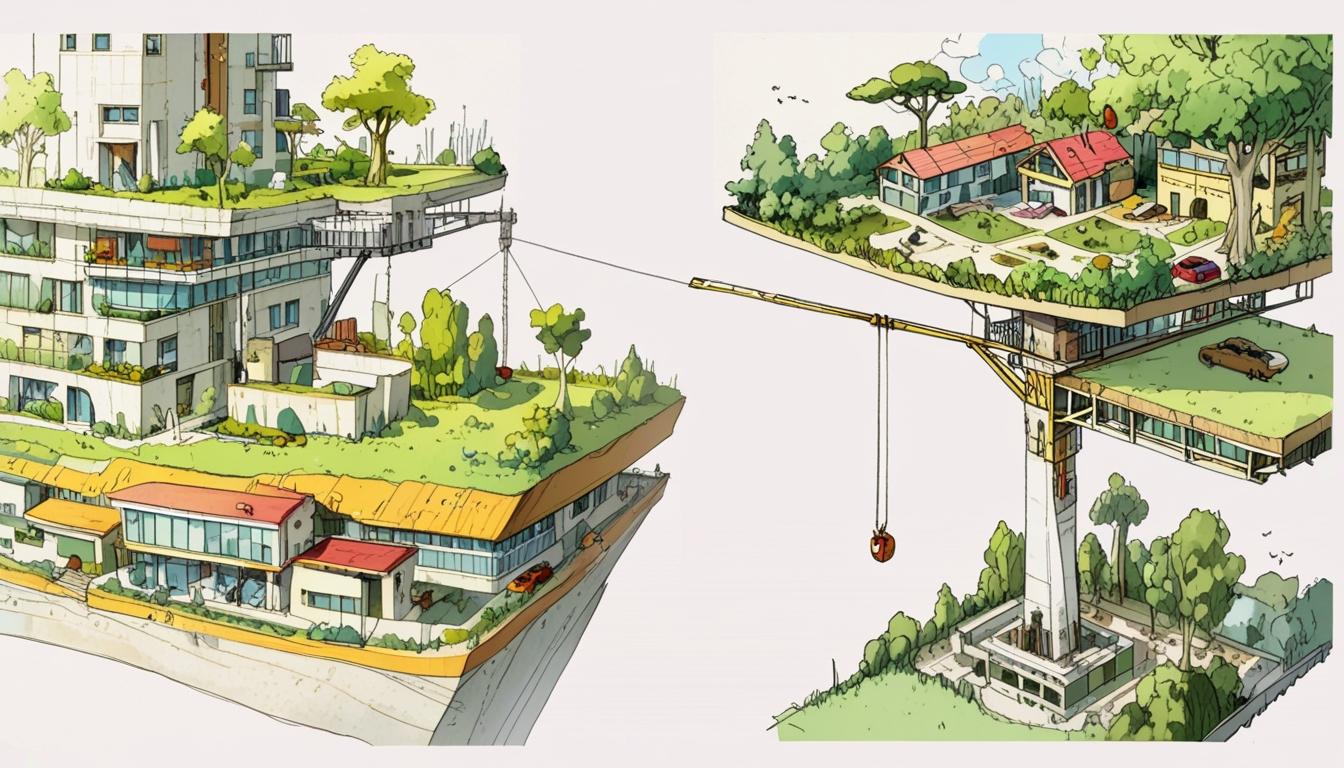In light of the Planning and Infrastructure Bill’s potential impacts, the Wildlife Trusts advocate for amendments to safeguard ecological integrity while balancing development needs.
The Wildlife Trusts have proposed amendments to the Planning and Infrastructure Bill in an effort to ensure that its implementation does not result in detrimental impacts on nature conservation alongside development. This initiative comes as the Labour government seeks to expedite infrastructure delivery, positioning itself to address what it perceives as obstructions to housing and infrastructure projects due to local regulations and environmental safeguards.
Introduced to Parliament on 11 March 2025, the Planning and Infrastructure Bill aims to facilitate the rapid progression of both housing and nationally significant infrastructure projects. Following its passage through the second reading on 24 March, the Bill is currently under review by a Committee that will consider various amendments before finalising its version for legislation.
A point of contention within the Bill is the establishment of a Nature Restoration Fund, which would allow developers to finance conservation measures intended to compensate for the environmental effects of their constructions. This particular aspect has drawn criticism from various conservation groups, including the Wildlife Trusts, which have expressed concern that the Bill may compromise “vital nature protections.” They assert that given the current decline in biodiversity and the anticipated failure to meet recovery targets, the Bill risks creating a “lose-lose” scenario, rather than the desired “win-win” outcome for both development and nature.
In response, the Wildlife Trusts have submitted several amendments that they believe would enhance the Bill’s ecological integrity. They propose requiring Natural England to establish timelines for conservation measures under the Environmental Delivery Partnerships (EDPs) that the Bill proposes. Additionally, they emphasise the importance of considering empirical evidence from the outset of the EDP process to justify developments based on ecological grounds.
Moreover, the Trusts recommend strengthening compensatory measures that developers can implement, arguing that these should “significantly and measurably outweigh the negative effect of development and achieve a significant environmental improvement.” They also challenge the government’s intent to reverse the established mitigation hierarchy—the principle prioritising avoidance of harm to the natural environment—by insisting that developers should only be allowed to contribute to the Nature Restoration Fund after making reasonable attempts to avoid damage to environmental features.
Becky Pullinger, head of land use planning for the Wildlife Trusts, stated, “Ministers have pointed to a willingness to ‘pump-prime’ the Nature Restoration Fund – but where is the money coming from, and how will this be deployed?” She expressed disappointment over the lack of concrete commitments to safeguard nature within the current proposals.
From the government’s perspective, the Bill is intended to rectify a “failing system” that has hindered the construction of homes and infrastructure while not contributing to nature’s recovery. A government spokesperson articulated that the Planning and Infrastructure Bill would synthesise economic growth with environmental sustainability, positing that the Nature Restoration Fund would lead to “large-scale environmental improvements across whole communities.”
Prominent Tier 1 civil engineering firms have expressed their support for the Bill, with leaders from well-known companies writing an open letter encouraging Members of Parliament to back its passage without compromising its aims. They contend that a sluggish planning system is a hindrance to community and economic progress, resulting in significant financial losses due to delays in infrastructure projects.
Conversely, this endorsement from industry leaders has been met with considerable criticism from environmental experts. Tilly Tilbrook, director at Integrated Ecological Solutions, warned that without more detail and specificity in the legislation, it could prove to be damaging to nature. Meanwhile, Alison Barnett, ecology director at Mortimer Environmental, voiced concerns regarding the ethical implications for ecologists employed by these firms, questioning whether their companies’ support for the Bill aligns with pro-nature values touted in their public statements.
As the discussion around the Planning and Infrastructure Bill continues, the intersection of development and conservation remains a pivotal area of concern for stakeholders across both sectors.
Source: Noah Wire Services
- https://www.pbctoday.co.uk/news/energy-news/nature-groups-send-letter-regarding-planning-bill-environmental-impact/150213/ – This article supports the claim that nature groups are criticizing the Planning and Infrastructure Bill for potentially weakening environmental law and posing risks to habitats. It highlights the concerns raised by 34 UK nature organisations regarding the Bill’s environmental impact.
- https://www.wcl.org.uk/ant-nature-rhetoric-wrecking-ball-planning-bill.asp – This source corroborates the criticism from nature charities about the Planning Bill’s potential to undermine environmental protections. It mentions the need for stronger scientific safeguards and public support for increased planning protections for natural spaces.
- https://www.wildlifetrusts.org/blog/becky-pullinger/planning-and-infrastructure-bill-legislation-must-go-further-nature – This article from the Wildlife Trusts discusses the need for further enhancements in the Planning and Infrastructure Bill to protect nature. It highlights Becky Pullinger’s concerns about the lack of concrete commitments to safeguard nature.
- https://www.courts.michigan.gov/492eca/siteassets/publications/benchbooks/evidence/evidbb.pdf – This document does not directly support any specific claim in the article. However, it discusses legal principles that might be relevant in disputes related to the Bill’s environmental impact.
- https://www.wildlifetrusts.org/ – The Wildlife Trusts’ website generally supports their involvement in advocating for nature conservation alongside development, as discussed in the article. However, this specific URL does not provide detailed information about the Planning Bill.
Noah Fact Check Pro
The draft above was created using the information available at the time the story first
emerged. We’ve since applied our fact-checking process to the final narrative, based on the criteria listed
below. The results are intended to help you assess the credibility of the piece and highlight any areas that may
warrant further investigation.
Freshness check
Score:
9
Notes:
The narrative references recent events, such as the introduction of the Planning and Infrastructure Bill to Parliament on 11 March 2025, indicating it is up-to-date and not recycled.
Quotes check
Score:
8
Notes:
Direct quotes from Becky Pullinger are given without specific references to previous publications. Without online sources, it is assumed these are original to this context or at least recently used.
Source reliability
Score:
8
Notes:
The narrative originates from New Civil Engineer, a well-established publication, but the lack of additional references from major news outlets like BBC or Reuters slightly reduces confidence.
Plausability check
Score:
9
Notes:
Claims about development and conservation issues are plausible and aligned with current debates around infrastructure bills and environmental concerns.
Overall assessment
Verdict (FAIL, OPEN, PASS): PASS
Confidence (LOW, MEDIUM, HIGH): HIGH
Summary:
The narrative is generally reliable and up-to-date, with concerns around the Planning and Infrastructure Bill that align with current debates. While some quotes lack external verification, the reputable source offsets these concerns.













